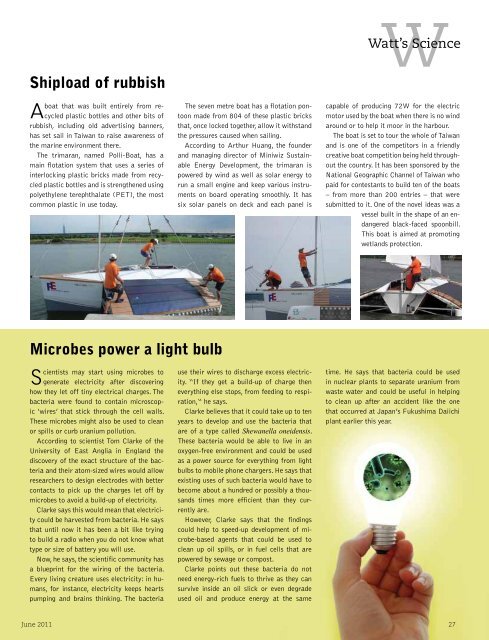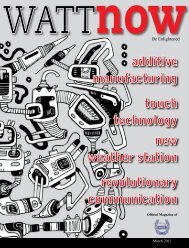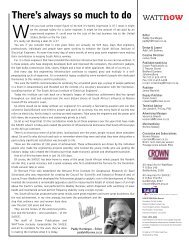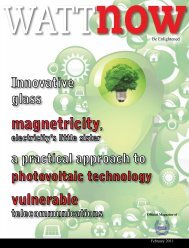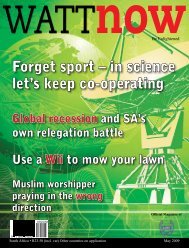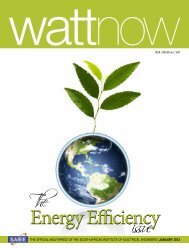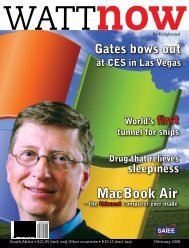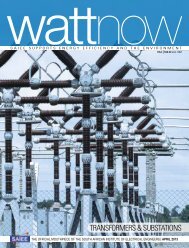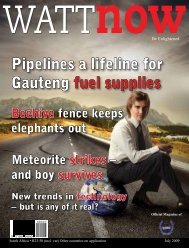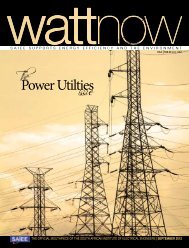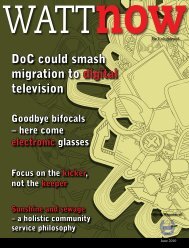download a PDF of the full June 2011 issue - Watt Now Magazine
download a PDF of the full June 2011 issue - Watt Now Magazine
download a PDF of the full June 2011 issue - Watt Now Magazine
Create successful ePaper yourself
Turn your PDF publications into a flip-book with our unique Google optimized e-Paper software.
Shipload <strong>of</strong> rubbish<br />
boat that was built entirely from recycled<br />
plastic bottles and o<strong>the</strong>r bits <strong>of</strong><br />
A<br />
rubbish, including old advertising banners,<br />
has set sail in Taiwan to raise awareness <strong>of</strong><br />
<strong>the</strong> marine environment <strong>the</strong>re.<br />
The trimaran, named Polli-Boat, has a<br />
main flotation system that uses a series <strong>of</strong><br />
interlocking plastic bricks made from recycled<br />
plastic bottles and is streng<strong>the</strong>ned using<br />
polyethylene terephthalate (PET), <strong>the</strong> most<br />
common plastic in use today.<br />
The seven metre boat has a flotation pontoon<br />
made from 804 <strong>of</strong> <strong>the</strong>se plastic bricks<br />
that, once locked toge<strong>the</strong>r, allow it withstand<br />
<strong>the</strong> pressures caused when sailing.<br />
According to Arthur Huang, <strong>the</strong> founder<br />
and managing director <strong>of</strong> Miniwiz Sustainable<br />
Energy Development, <strong>the</strong> trimaran is<br />
powered by wind as well as solar energy to<br />
run a small engine and keep various instruments<br />
on board operating smoothly. It has<br />
six solar panels on deck and each panel is<br />
W<br />
<strong>Watt</strong>’s Science<br />
capable <strong>of</strong> producing 72W for <strong>the</strong> electric<br />
motor used by <strong>the</strong> boat when <strong>the</strong>re is no wind<br />
around or to help it moor in <strong>the</strong> harbour.<br />
The boat is set to tour <strong>the</strong> whole <strong>of</strong> Taiwan<br />
and is one <strong>of</strong> <strong>the</strong> competitors in a friendly<br />
creative boat competition being held throughout<br />
<strong>the</strong> country. It has been sponsored by <strong>the</strong><br />
National Geographic Channel <strong>of</strong> Taiwan who<br />
paid for contestants to build ten <strong>of</strong> <strong>the</strong> boats<br />
– from more than 200 entries – that were<br />
submitted to it. One <strong>of</strong> <strong>the</strong> novel ideas was a<br />
vessel built in <strong>the</strong> shape <strong>of</strong> an endangered<br />
black-faced spoonbill.<br />
This boat is aimed at promoting<br />
wetlands protection.<br />
Microbes power a light bulb<br />
Scientists may start using microbes to<br />
generate electricity after discovering<br />
how <strong>the</strong>y let <strong>of</strong>f tiny electrical charges. The<br />
bacteria were found to contain microscopic<br />
‘wires’ that stick through <strong>the</strong> cell walls.<br />
These microbes might also be used to clean<br />
or spills or curb uranium pollution.<br />
According to scientist Tom Clarke <strong>of</strong> <strong>the</strong><br />
University <strong>of</strong> East Anglia in England <strong>the</strong><br />
discovery <strong>of</strong> <strong>the</strong> exact structure <strong>of</strong> <strong>the</strong> bacteria<br />
and <strong>the</strong>ir atom-sized wires would allow<br />
researchers to design electrodes with better<br />
contacts to pick up <strong>the</strong> charges let <strong>of</strong>f by<br />
microbes to avoid a build-up <strong>of</strong> electricity.<br />
Clarke says this would mean that electricity<br />
could be harvested from bacteria. He says<br />
that until now it has been a bit like trying<br />
to build a radio when you do not know what<br />
type or size <strong>of</strong> battery you will use.<br />
<strong>Now</strong>, he says, <strong>the</strong> scientific community has<br />
a blueprint for <strong>the</strong> wiring <strong>of</strong> <strong>the</strong> bacteria.<br />
Every living creature uses electricity: in humans,<br />
for instance, electricity keeps hearts<br />
pumping and brains thinking. The bacteria<br />
use <strong>the</strong>ir wires to discharge excess electricity.<br />
“If <strong>the</strong>y get a build-up <strong>of</strong> charge <strong>the</strong>n<br />
everything else stops, from feeding to respiration,“<br />
he says.<br />
Clarke believes that it could take up to ten<br />
years to develop and use <strong>the</strong> bacteria that<br />
are <strong>of</strong> a type called Shewanella oneidensis.<br />
These bacteria would be able to live in an<br />
oxygen-free environment and could be used<br />
as a power source for everything from light<br />
bulbs to mobile phone chargers. He says that<br />
existing uses <strong>of</strong> such bacteria would have to<br />
become about a hundred or possibly a thousands<br />
times more efficient than <strong>the</strong>y currently<br />
are.<br />
However, Clarke says that <strong>the</strong> findings<br />
could help to speed-up development <strong>of</strong> microbe-based<br />
agents that could be used to<br />
clean up oil spills, or in fuel cells that are<br />
powered by sewage or compost.<br />
Clarke points out <strong>the</strong>se bacteria do not<br />
need energy-rich fuels to thrive as <strong>the</strong>y can<br />
survive inside an oil slick or even degrade<br />
used oil and produce energy at <strong>the</strong> same<br />
time. He says that bacteria could be used<br />
in nuclear plants to separate uranium from<br />
waste water and could be useful in helping<br />
to clean up after an accident like <strong>the</strong> one<br />
that occurred at Japan’s Fukushima Daiichi<br />
plant earlier this year.<br />
<strong>June</strong> <strong>2011</strong> 27


